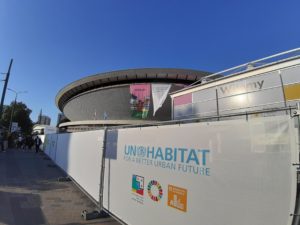Libraries transforming cities through information and culture: Report from the 11th World Urban Forum
23 abril 2024
From 26 to 30 June, mayors, UN agencies, local officials, NGOs and experts met at the 11th World Urban Forum, to discuss how to transform cities and so deliver sustainable development. IFLA was present in order to underline the place of libraries and information in making this happen.

With over 20 000 registered to attend in person in Katowice, Poland, and online, the Forum offered a busy programme covering the full range of issues that affect lives and livelihoods within cities, towns and villages.
Successful urban development can have a major positive effect on individual lives and the achievement of global development goals. The places that people live can have a determining impact on their ability to enjoy their rights and realise themselves fully.
By convening the World Urban Forum, UN Habitat – the United Nations agency for human settlements – aims to advance the discussion, and bring the benefits of new insights and ideas to more people.
For IFLA, the World Urban Forum is an opportunity to connect with the a level of government that often has a direct impact on libraries, and where there can be the most immediate possibilities to work with – and through – libraries to achieve policy goals.
As our article on libraires and urban regeneration, revitalisation and transformation underlined, there is a strong potential, although there needs to be more awareness in order to ensure that our institutions are more systematically included in planning.
Key themes in 2022
While the agenda was certainly broad, a number of subjects appeared again and again. The war in Ukraine – and the response of cities – was a clear priority, with local governments taking the lead in launching initiatives to give newcomers the warmest possible welcome, not least in the host country, Poland. Polish libraries and librarians have of course been part of this.
The role of local and regional governments in addressing climate change was also high on the agenda, with the contribution of culture highlighted as crucial in ensuring behaviour change and policy effectiveness. Events organised by the Climate Heritage Network, of which IFLA is a founding member, helped keep the focus on this.
A further theme was around digital inclusion, in particular as a response – or complement – to the notion of smart cities.
While the regulation and governance of digital technologies may appear more suited to the national level, speakers from across the UN system underlined both the role of the local in building the skills and capacities to navigate the digital world, and the need for the adoption of technology to work in a way that promotes democracy and inclusion.
This in particular is clearly an area where libraries can add immense value, as IFLA’s briefing on cities and digital rights underlines. Through our participation, it was possible to create new links and awareness of the work of libraries, which we will follow up on in order to identify opportunities for our Members.
The localisation agenda was also strong, with welcome progress in ensuring that the voice of local and regional governments is better recognised within the UN, and strong calls for greater devolution of powers and funding to match. Given local governments’ generally stronger recognition of the importance of libraries, such a development could well be positive for our field.
Finally, IFLA was represented at a side-event organised with UNESCO in order to talk about the concept of Media and Information Literate (MIL) Cities. In our presentation, we underlined why focusing on MIL was so vital in an information-abundant world, the key roles and responsibilities of cities, and how libraries represent a key, pre-existing network ready to make things happen.
We’re looking forward to following up with contacts made at the Forum, and will be sharing further information and opportunities in the coming month. We are grateful to Magdalena Gomulka and the team at the Silesian Regional Library for their support.